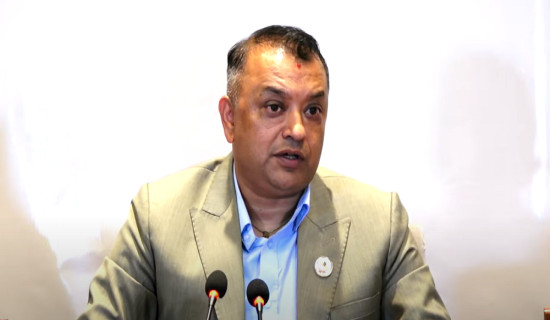- Thursday, 19 February 2026
Live An Ethical Life
Nishtha Shrestha
The sound of bells and soft murmurs from the crowd fill the environment. The sweet smell of incense and the flowers offered to the Almighty calm one's restless mind. Anyone who has entered a religious place has experienced these sensory cues. Once they are registered in the mind, one immediately enters a state of obedience and faith in the higher power to guide them through the troubles in their present life. One promises to live a righteous path and leaves with a lighter heart. Sadly, the moment the person steps out of the shrine, all is forgotten.
The first step of defiance is the littering. Anyone who dares to vandalise a statue of God is punished. We take utmost care to maintain the purity of the items which have to be used as an offering. When we have finished the task, without a second thought, we throw away the wrappers and the plastic bags outside the temple. The daily washed stones and frequent sweeping by the devotees stands in contrast to the heaps of rubbish outside a temple. If we do not hesitate to punish anyone who dares to desecrate an idol, then why do we stay silent when we see the littering?
The second hypocrisy is evident in the lives we lead. We say we are a religious country. We celebrate each festival with grandeur and attend sermons to listen to the words of God. This celebration and listening both seem to be superficial when one listens to the daily news as well as the events in our circle. The cultural excuse is that we are currently in Kaliyug. Does this then give us the free pass to cheat, lie and ruin the lives of people? Our moral compass seems to be active only in front of God. In other places, this compass is duly forgotten. Similar to how teachers monitored the exam halls: do we also need God to constantly watch over us to follow the ethical code?
The current state of humanity is not only a result of their personal decisions alone but also the influence of the environment. It is a tough world we live in. The competition is high and the resources limited. The fight for survival gets harder every day. With the ever present threat of financial crisis and the scenes of war, most of us are living under stress. When basic needs are difficult to be met, can we expect people to choose morality over survival? Each generation has their fair share of obstacles and threats. Then how did our ancestors manage to follow the moral code while we have failed so miserably?
The solutions to the questions raised above are difficult to find. More so because there is no single cause to our problem. Some plausible reasons behind these issues could be that the basic needs have expanded, the current moral codes need immediate modification and maybe people do not care about these issues as in the past. Everyone is free to choose their beliefs and way of living. This freedom, however, cannot be exercised at the expense of another life. It is easy to blame those in power for the failures of society and ignore our own duties. And if we believe we can wash away our unethical actions with a visit to the temple, then the society has indeed failed.
















